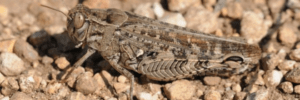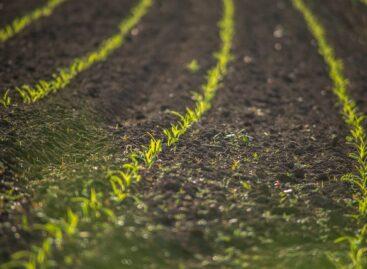Italian locusts have multiplied in two southern counties
During the summer, the National Food Chain Safety Office (Nébih) received several reports from Bács-Kiskun and Csongrád-Csanád counties about the Italian locust, which is multiplying and causing significant damage. The warm weather of the last two years greatly favored the reproduction of locusts, and it is expected that the population of the species will continue to increase in the coming year.

(Photo: Nébih/Zsolt Dobos)
In the second half of July this year, for the first time in the southern part of the Bács-Kiskun county, on the border of Balotaszállás, growers noticed unusually large locust damage. After that, at the beginning of August, producers in the Csongrád-Csanád county also reported to the authorities the extensive damage caused by locusts. Among other things, 100% of the half-ripe crops of a 2.5-hectare sea buckthorn plantation in Anvil were damaged by insects, which was confirmed by the government office’s on-site inspection. According to the grower, despite the insecticide protection carried out several times, he observed another “locust invasion” the day after spraying. In addition, several farmers reported that locusts also caused 100% damage to potato, cauliflower, corn and alfalfa crops.
In the Pusztamérges and Öttömös areas of the Csongrád-Csanád counties, the producers also stated about increasing locust damage
In both settlements, the insects caused about 20% damage, in the former settlement in the carrot field under harvest, while in Öttömös in the pumpkins. In sheer rage, the foliage of an asparagus stand was completely chewed off, leaving only the thick stems of the plant. Despite the spraying, the damage was around 10%. This year’s weather, just like the last two years, proved to be favorable for locusts and greatly contributed to the proliferation of several straight-winged species, including the Italian locust. Moreover, July 2024 was the warmest and the 7th driest month since the beginning of domestic meteorological observations (1901). This August was the second warmest month since 1901. All of this “favored” the growth of the Italian locust in the sandy areas of the two counties most affected by the drought, i.e. Bács-Kiskun and Csongrád-Csanád. In the following year, we can count on a further increase in the locust population and the extent of the damaged area.
Nébih
Related news
The government provides significant funding to support the development of crop dryers
🎧 Hallgasd a cikket: Lejátszás Szünet Folytatás Leállítás Nyelv: Auto…
Read more >Related news
Nestlé to sell remaining ice-cream assets but commits to Froneri venture
🎧 Hallgasd a cikket: Lejátszás Szünet Folytatás Leállítás Nyelv: Auto…
Read more >









